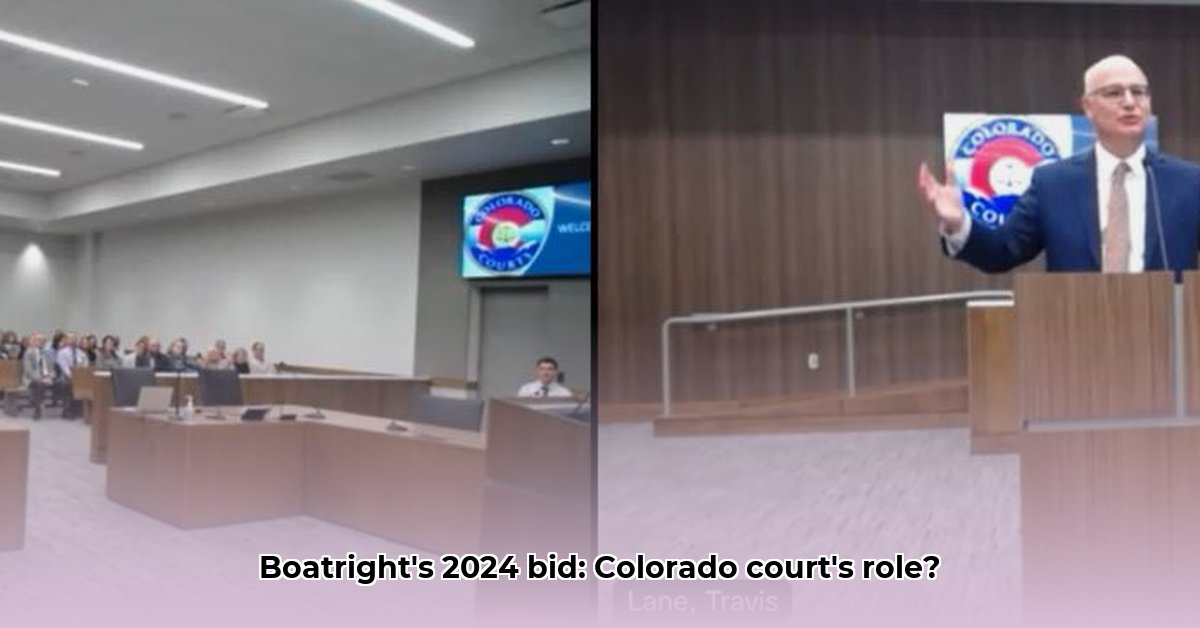Brian D. Boatright’s journey to the Colorado Supreme Court exemplifies dedication and legal expertise. His career path, from Deputy District Attorney gaining invaluable experience in criminal law to District Court Judge overseeing civil, juvenile, and probate matters, provided him with a comprehensive understanding of the Colorado legal system. Consistently high performance reviews, averaging 3.6 out of 4, attest to his commitment to excellence. For comparison, see information on another judge’s career here.
Navigating Judicial Appointments and Political Considerations in Colorado
Justice Boatright’s 2024 retention election, where he secured a commanding 62.8% of the vote, underscores public confidence and the Colorado Commission on Judicial Performance’s recommendation for his continued service. This prompts a deeper examination of whether factors beyond his qualifications influenced the outcome. While Colorado’s judicial selection process aims to minimize political influence, the extent to which it shields the judiciary from political pressures remains a subject of debate.
Key Highlights of Justice Boatright’s Career
- Overwhelming Public Support: His re-election with 62.8% of the vote showcases the trust placed in him by Colorado citizens.
- Trump Ballot Case Dissent: His dissenting opinion in this nationally significant case highlighted differing interpretations of constitutional law and due process.
- Nuanced Political History: Despite a Republican registration prior to 2020, his appointment by Democratic Governor John Hickenlooper illustrates the complexities of Colorado’s political landscape and the potential for merit-based judicial selections.
The Trump Ballot Ruling: A National Stage for Legal Interpretation & Dissent
Justice Boatright’s dissenting opinion in the Colorado Supreme Court case concerning Donald Trump’s exclusion from the state’s primary ballot positioned him prominently in the national spotlight. This case, which the U.S. Supreme Court later overturned, ignited a nationwide debate. His dissent represented a significant legal disagreement on a deeply politically charged issue. The increased attention inevitably affected public perceptions. The long-term implications of Justice Boatright’s dissenting opinion on Colorado’s 2024 election and beyond remain a significant point of analysis.
Political Affiliations and Judicial Selection: Untangling the Threads
Determining Justice Boatright’s political leanings requires careful evaluation. While he was registered as a Republican before 2020 and made a $150 contribution to Republican candidates, his appointment to the Supreme Court by a Democratic Governor suggests a more nuanced political context. Ballotpedia’s assessment of his political leaning as “indeterminate” accurately reflects the complexities of his background. Was this a deliberate effort to avoid strong party affiliations, or does his appointment demonstrate a genuine prioritization of merit in judicial selection?
Colorado’s assisted appointment system aims to minimize political influence in judicial selection. The Governor selects candidates from a list prepared by the Colorado Supreme Court Nominating Commission, ostensibly prioritizing merit. However, ongoing discussions persist regarding the effectiveness of this system in completely shielding the judiciary from political pressures.
Long-Term Implications for Colorado’s Legal System
The long-term impacts of Justice Boatright’s career, including his reelection, are multifaceted. These impacts extend to diverse groups, including Colorado voters, legal professionals, political analysts, and legal scholars. Each group experiences both immediate and lasting consequences. For example, Colorado voters will continually evaluate judicial performance, while legal scholars will conduct in-depth research on his rulings and their precedential value. This ongoing analysis will shape the understanding of Justice Boatright’s overall influence on Colorado’s legal system.
Brian D. Boatright’s career exemplifies the intricate relationship between law and politics. His story is that of a jurist with extensive experience, impactful decisions, and a politically nuanced profile, navigating the complexities of judicial independence within Colorado’s dynamic political environment. His future decisions will contribute to shaping the state’s legal landscape, and ongoing scholarship explores the breadth and depth of his influence.
Due Process and the 14th Amendment: Unpacking Justice Boatright’s Dissent
The Colorado Supreme Court’s 4-3 decision to exclude Donald Trump from the 2024 primary ballot ignited a national controversy. At the heart of this debate was Justice Brian Boatright’s dissenting opinion, raising critical questions about due process and the interpretation of the 14th Amendment. This dissent highlighted the ongoing challenge of balancing constitutional interpretation with principles of individual fairness.
The Core of the Dissent: Due Process and Divergent Legal Interpretations
Boatright, joined by Justices Samour and Berkenkotter, argued that Trump was denied sufficient opportunity to defend himself, contending that the reliance on the House Select Committee report and the overall proceedings violated his rights. The majority, in contrast, asserted that ample time and evidence were provided. This divergence underscores the critical balance between constitutional interpretation and individual fairness. What implications does this have for future cases involving similar challenges to constitutional rights?
The case centered on Section 3 of the 14th Amendment, which disqualifies individuals who have engaged in insurrection or rebellion. The central question was whether Trump’s actions at the Capitol constituted an “insurrection.” Boatright’s dissent suggested that the court exceeded its authority by applying this clause without a prior criminal conviction. The dissenting justices advocated for a more stringent legal standard, emphasizing the gravity of disqualification.
Implications and Lingering Uncertainty of the Dissenting Opinion
While the dissent did not overturn the ruling, it introduced an element of uncertainty into the process, raising questions about the fairness and accuracy of the interpretation while potentially influencing future challenges. The dissenting opinion serves as a crucial counterpoint to the majority’s decision, ensuring that the debate continues beyond the immediate context of the 2024 election cycle. It also casts doubt on the appropriateness of using a House committee report as definitive evidence in such a consequential legal matter. Consider this a legal issue poised to be explored and debated in future cases. Will this initial ruling withstand the test of time and further legal scrutiny?
- The dissenting opinion challenged the court’s procedures and its interpretation of the 14th Amendment.
- It highlighted the inherent tension between the need for swift constitutional interpretation and the protection of individual rights.
- The dissenting justices maintained that the evidence presented was insufficient to justify disqualification.
- Justice Boatright’s dissent casts doubt on the precedent set by the majority, influencing legal discourse far beyond the boundaries of Colorado.
- The debate over the definition of “insurrection” and the correct application of the 14th Amendment is set to continue.
Justice Boatright’s Judicial Performance: Reconciling Conflicting Accounts
Justice Boatright’s tenure on the Colorado Supreme Court, including his service as Chief Justice from 2021 to 2024, presents a seemingly contradictory picture. His consistent high performance ratings (averaging 3.6/4) suggest strong public support and professional aptitude. However, serious allegations of scandals and cover-ups have also surfaced. How can these conflicting accounts be reconciled? Moreover, the potential limitations of the evaluation process itself raise important questions about transparency and accountability within the Colorado judicial system.
High Ratings vs. Serious Misconduct Allegations: A Deep Dive
The Colorado Commission on Judicial Performance has consistently given Justice Boatright positive evaluations, highlighting his well-written opinions, appropriate courtroom demeanor, and favorable survey scores. Yet, credible sources allege his involvement in actions that obstructed justice, improperly delayed referrals to prosecutors, and engaged in other unethical communications. The Commission’s apparent dismissal of these complaints, often without providing detailed explanations, fuels public skepticism about the impartiality and thoroughness of the evaluation process. Was the system truly objective, or were crucial parts of the story deliberately concealed? This perceived lack of transparency inevitably casts a shadow on the positive evaluations. How can public trust be maintained in the face of such significant discrepancies between official evaluations and serious allegations?
Limitations of the Current Evaluation Process: A Question of Scope
The Colorado judicial system relies on formal evaluations by the Commission and periodic public retention elections. But do these mechanisms truly capture the full picture of Justice Boatright’s Judicial Performance in High-Profile Cases? The formal evaluations, based on a limited selection of opinions and self-reporting, appear to offer an incomplete assessment of his overall performance. Some argue that the current process is simply insufficient for thoroughly evaluating a high-ranking judicial official. The specific weighting given to different elements of the assessment also lacks clarity. Is public perception given as much weight as formal Commission review? This ambiguity makes it difficult for Colorado voters to make fully informed decisions during retention elections.
Reforms for Transparency and Accountability: Steps Forward
The situation surrounding Justice Boatright underscores the urgent need for meaningful reforms. The Colorado Commission on Judicial Performance must commit to conducting far more thorough and transparent investigations into all credible allegations of misconduct. A publicly released report detailing the Commission’s findings and explaining any discrepancies between official evaluations and serious accusations is essential for restoring public confidence. The system needs stricter protocols for handling allegations of misconduct, including independent oversight mechanisms to ensure impartiality. Furthermore, Colorado voters must demand greater accountability from their judicial officials. Re
- Wind Turbine to Power Home: Nacelle Design Improvements Advance - October 26, 2025
- Wind Turbine Blade Length: How Long Is Too Long? - October 24, 2025
- Nacelle Wind Turbine Innovation: Powering a Greener Future, One Revolution at a - October 22, 2025
















